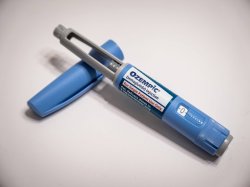On Ozempic? Diet and Exercise are Still Key, Montclair Experts Say
Nutrition and Kinesiology experts share tips about how those on GLP-1 weight loss drugs used to treat diabetes and obesity can maintain healthy eating and fitness habits
Posted in: College News and Events, Homepage News and Events

If you are not among the millions of people on Ozempic, Wegovy and other GLP-1 agonists medications for weight loss, chances are you know someone who is. In a country where obesity remains widespread — 2 in 5 adults or 42 percent of the U.S. population — the GLP-1 agonist drugs have been recognized as life-changing.
There are many health benefits to weight loss but long-term, sustainable weight loss must be paired with healthy eating and regular exercise plans, according to Montclair State University nutrition and kinesiology experts.
Nutrition and Food Studies Assistant Professor Jong Min Lee, who works privately with telehealth clients on weight-loss drugs, and Kinesiology Associate Professor Evan Matthews, a cardiovascular and exercise physiologist, recommend focusing on healthy, mindful eating and a practical exercise routine for long-term physical and mental health benefits.

Know the Pros and Cons of Weight Loss Drugs
Weight loss drugs such as Zepbound, Mounjaro and Ozempic are increasingly prescribed for people with diabetes for improved health and to many people who are not diabetic or considered obese [a body mass index of 30 or above]. While the drugs do help suppress a person’s appetite, resulting in them eating less and losing weight, Lee cautions that they are “not magic pills.”
“I do have some concerns,” Lee says, noting that she worries about “a distorted view of food and body image and thinness,” particularly among her younger clients. Once clients start losing weight, “they don’t want to see the nutritionist as often as before because they rely on the drug,” Lee says, warning that weight loss should be accompanied by good nutrition. Without it, the weight loss will likely only be temporary, particularly if they eventually get off of the drug.
“The medications are powerful. You’re initially going to lose weight whether you exercise or not,” Matthews says. Eventually, though, the weight will plateau and diet and exercise are going to be necessary.”
Exercise Does More Than Help with Weight Loss
A lifestyle change also should include exercise, which is even suggested on Ozempic’s website, says Matthews. “Most of the benefits of exercise are not about weight loss. Yes, exercise does improve and help with weight loss but there’s just so much more that it does, and you’re not getting any of those benefits if you’re only taking a drug like this. There’s very little that exercise does not improve.” Some of those benefits include:
- Improves heart health, builds muscle and increases metabolic rate
- Combats sluggishness and tiredness in daily life
- Provides a mental health boost for those struggling with anxiety and depression
- Lowers some cancer risks and maintains bone health
The key takeaway is that a balanced, sustainable approach incorporating medication (if appropriate, and under guidance from a licensed physician), a moderate calorie-controlled diet, and consistent enjoyable exercise is most likely to lead to successful long-term weight management.

Don’t Forget to Enjoy Food
Just as exercise offers other benefits aside from weight loss, food is far more than fuel for the body. While dietitians and researchers like to emphasize mindful eating, Lee says that it’s also important to take pleasure in eating.
“Food is enjoyable. Food is culture and it’s also tradition and memories,” she says. “If you are obsessed with weight or body image, and see food only as a fuel or obsess about how many carbs you eat today, then you’re missing out on a lot of components of the enjoyment of food.”
Diet, Nutrition and Exercise Tips from Montclair experts
Lee and Matthews share these 12 nutrition and exercise tips:
- Eat a well-balanced diet, be mindful of portion size and enjoy your food. Half your plate should be fruits and vegetables and the other half protein and grains, as recommended by the U.S. Department of Agriculture’s “My Plate” guidelines.
- Increase your protein intake to counter weight loss due to muscle mass.
- Hydrate, hydrate, hydrate. Studies show that drinking water before meals can help you feel full, help boost your metabolism, assist with removing waste and is, of course, important when exercising.
- Consult with your doctor regularly and work with a nutritionist, as they can assist you with setbacks or plateaus.
- Be mindful of your mental health. Forgive yourself for any missteps and don’t beat yourself up. Also, surround yourself with people who are encouraging and supportive of your health goals.
- Don’t deprive yourself, as it may have negative consequences such as binging.
- View weight loss as a lifestyle change and not a short-term journey. Sustainable weight loss requires adopting habits you can maintain long-term.
- Safe and effective weight loss is generally 1-2 pounds per week. Faster weight loss is often unsustainable and can have negative health consequences.
- Be mindful of low calorie intake. Consuming under 1,200 calories per day for women or 1,800 calories per day for men is considered an “ultra low-calorie diet” that can lead to negative physiological effects.
- When tracking weight, it’s better to weigh yourself less often. Be mindful that daily fluctuations are normal and don’t always reflect true fat loss or gain. Weigh yourself consistently, ideally first thing in the morning.
- Body fat percentage is a more accurate metric than just weight. Only measure about once per month due to variability in measurements.
- Focus on overall wellness, not just the numbers. While body composition and weight are important for health, it’s important not to become overly obsessed, as that can lead to negative mental health impacts. “Not everything you lose is going to be fat. Weight loss without exercise is going to accelerate that, so exercise is important to prevent that, especially if you’re doing something long-term. If you’re taking this medication for the rest of your life, you really should be trying to do something to maintain muscle mass.”
I’m a _______, tell me more:
Prospective Student / Parent: Learn more about Nutrition and Food Studies and Kinesiology or check out our open house schedule or apply online.
Media: Contact the Media Relations team for assets or to schedule an interview with the researcher about this topic. See more Faculty Experts and hi-res media assets available for download.
